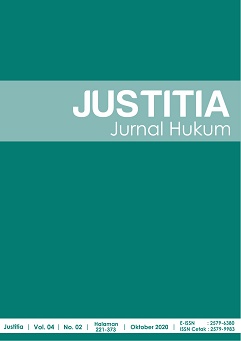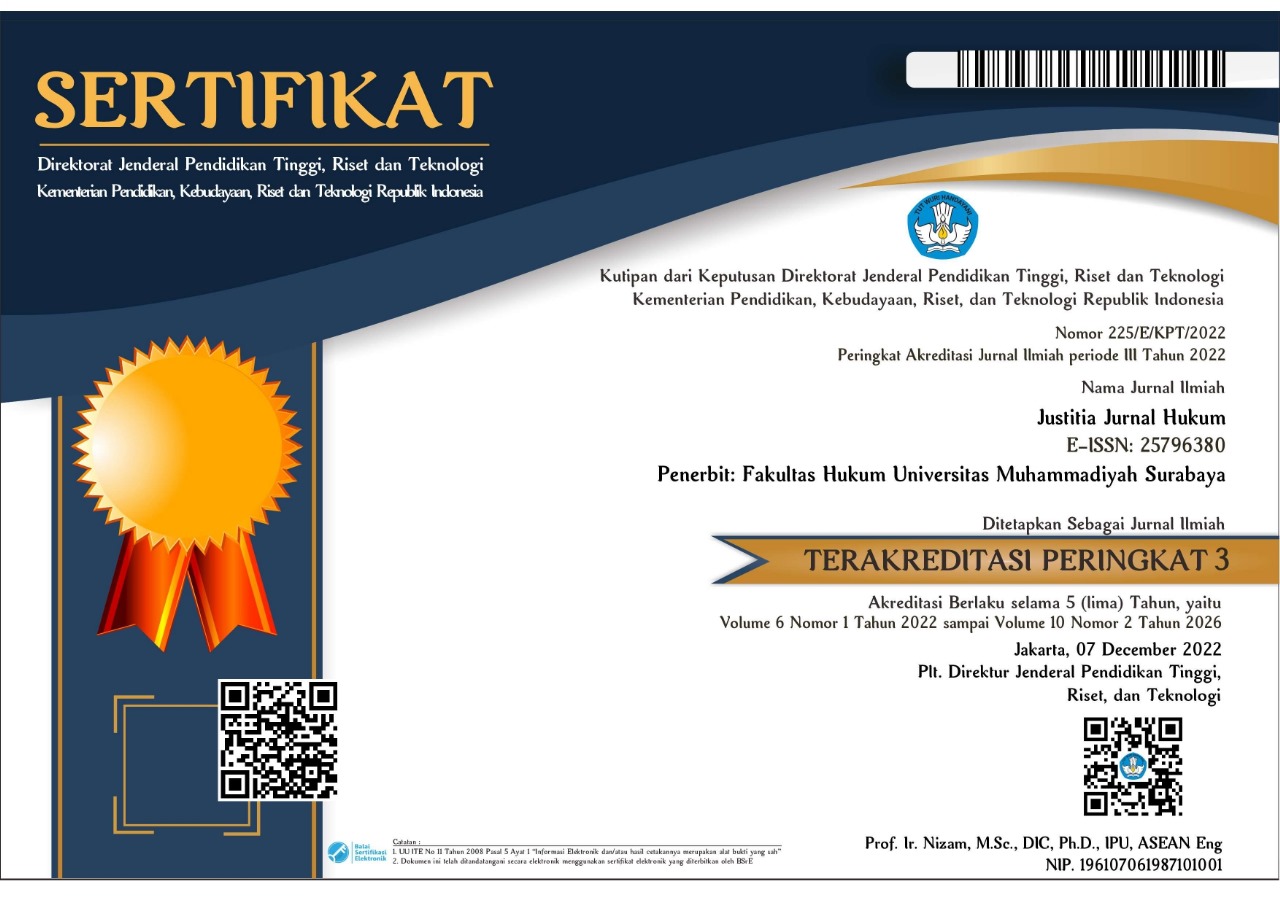Urgensi Revisi Peraturan Pemerintah Pengganti Undang-Undang Nomor 23 Tahun 1959 Sebagai Kontekstualisasi Iklim Demokrasi
DOI:
https://doi.org/10.30651/justitia.v4i2.5362Abstract
Article 12 of the 1945 Constitution of the Republic of Indonesia states that the President has the authority to determine state of emergency, meanwhile the emergency requirements are determined by law. In the Indonesian legal system, the only regulation issued in emergency situation is in lieu of law Number 23 of 1959. The lieu of law was issued by the President in an unstable condition, namely a change of the constitution from the 1950 Constitution to the 1945 Constitution. testing by the House of Representatives, whereas the testing of the lieu of law is a requirement determined in Article 22 of the 1945 Constitution. In addition to these factors, in lieu of law No. 23 of 1959 is also material which is often opposed to democratic values. Therefore, revision of in lieu of law Number 23 of 1959 is needed, because in lieu of law Number 23 of 1959 has not fulfilled the requirements in accordance with the current requirements. The research method used in this article is normative juridical. The conclusion in this article is in lieu of law No. 23 of 1959 needs to be immediately revised as a contextualist welfare of democracy.
References
Asshiddiqie, Jimly. Pokok-Pokok Hukum Tata Negara Indonesia Pasca Reformasi. Jakarta: PT Bhuana Ilmu Populer, 2007.
Boulanger, Christian. “Constitutionalism in East Central Europe? The Case of Slovakia under Meciar.†East European Quarterly 33, no. 1 (1999): 21–50.
Chandranegara, Ibnu Sina. “The Review of Government Regulation in Lieu of Law Regarding Constitutional Authority Dispute among the State Institutions.†Yudisial 5, no. 1 (2009): 1–16.
Crowder, George. “Value Pluralism, Constitutionalism, and Democracy: Waldron and Berlin in Debate.†Review of Politics 81, no. 1 (2019): 101–27. https://doi.org/10.1017/S0034670518000943.
Dale, Cypri Jehan Paju. “Emancipatory Democracy and Political Struggles in Post-Decentralization Eastern Indonesia.†Development (Basingstoke) 58, no. 1 (2016): 31–41. https://doi.org/10.1057/dev.2015.54.
Gamble, Barbara S. “Putting Civil Rights to a Popular Vote.†American Journal of Political Science 41, no. 1 (1997): 245. https://doi.org/10.2307/2111715.
Greenfield, Kent. “The Unjustified Absence of Federal Fraud Protection in the Labor Market.†Yale Law Journal 107, no. 3 (1997): 715–88. https://doi.org/10.2307/797253.
HSB, Ali Marwan. “Judicial Review Dan Legislative Review Terhadap Peraturan Pemerintah Pengganti Undang-Undang.†Legislasi Indonesia 17, no. 1 (2020): 51–61.
Ibrahim, Johni. Teori Dan Metodologi Penelitian Hukum Normatif. Malang: Bayumedia Publishing, 2007.
Keefer, Philip. “Elections, Special Interests, and Financial Crisis.†International Organization 61, no. 3 (2007): 607–41.
https://doi.org/10.1017/S0020818307070208.
Nugroho, Heru. “Demokrasi Dan Demokratisasi: Sebuah Kerangka Konseptual Untuk Memahami Dinamika Sosial-Politik Di Indonesia.†Jurnal Pemikiran Sosiologi 1, no. 1 (2015): 1. https://doi.org/10.22146/jps.v1i1.23419.
Risdiarto, Danang. “Legalitas Dekrit Presiden 5 Juli 1959 Dan Pengaruhnya Bagi Perkembangan Demokrasi Di Indonesia.†Jurnal Legislasi Indonesia 15, no. 1 (2018): 59–68.
Downloads
Published
How to Cite
Issue
Section
License











